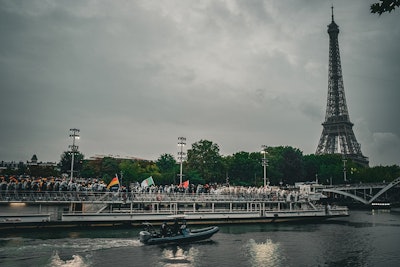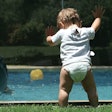
For a century, it was illegal to swim in the Seine, the river that flows through the heart of Paris. The law was established as a matter of public health — the river was so polluted with debris and bacteria, it would be dangerous to swim in. If a swimmer ingested the murky, infested water, they’d get sick.
A few years ago, the city initiated a $1.5 billion cleanup effort. This included a giant underground storage basin to collect runoff (to stop it from entering the Seine bringing with it all the dog poop and kebab wrapper mayonnaise washing down from the streets of the capital), treat it, then release the cleaned water into the mighty river. Something like our Reverse Osmosis filtration systems, only without the RO.
Brimming with confidence in the new system, as the Olympics approached, officials chose the previously unswimmable Seine as the venue for three triathlon swimming events. Government officials, such as President Emmanuel Macron and Paris Mayor Anne Hidalgo, assured the public with promises to swim the river themselves to prove its cleanliness. The Seine wasn’t clean enough for Olympic swimming yet, they admitted, but it soon would be. Pretty soon. In plenty… in time for the Games. For sure.
As the Games approached, officially, confidence remained high despite continued unsafe water tests. As the opening ceremonies hove into view, and the date of the men’s triathlon swim in the Seine approached, anxiety began to increase.
Right up until the scheduled start for the men’s race on Tuesday, July 30, organizers held out hope for clean water, but the water failed to improve, and the event had to be postponed. The women’s event seemed headed for the same fate, but four hours before the start, the waters miraculously cleared! And officials gave the go-ahead; into the swirling brown went the ladies.
With all the focus on water quality, little attention was given to the swift Seine current which, at mid-stream, approached the speed of the swimmers themselves. Meaning that a swimmer going upstream in the middle of the river would hardly make any headway at all. Swimmers quickly adjusted by lining up and swimming as close to the bank as possible to move upriver, and then making a sharp cut toward the middle when necessary.
The women’s event finished on time, followed by the postponed men’s event, and everyone hoped the story might end there. But then people started getting sick. And some of these were contestants in the third race, the mixed men/women’s team triathlon.
By the time the third race was due to start, one member of the Belgian mixed team, Claire Michel, had been hospitalized for E. coli, presumably ingested in the river during her swim, and the team had to pull out. A member of the Swiss team, Adrien Briffod, had to withdraw due to what was termed “a gastrointestinal infection,” but he was replaced.
Mercifully, the final event concluded on August 4, the Olympic flag was lowered a week later, and it all became part of the growing Olympic legend, and a cautionary tale about promising quality water for a big event based on hope. Does that sound familiar to anyone?
It’s interesting to note that one team, Great Britain, took measures to head off the problem by feeding their team probiotics in the days leading up to the events.
This is a good strategy, according to Dr. Bill Sullivan, microbiologist at the Indiana University School of Medicine. Sullivan told SELF magazine that probiotics act like little Olympians themselves, basically outperforming harmful bacteria like Giardia, E. coli and Crypto, in the competition for food.
“When microbes get into your gut, they need resources in order to replicate and divide, and if you overwhelm your gut with some probiotics that are beneficial — bacteria that don’t harm you — they will usurp those resources in your gut and deprive the bad guys,” he said.
Whether the strategy was the reason or not, Great Britain took bronze in the final triathlon race.
All in all, it was an embarrassment for Olympic officials, who trusted the host nation’s assurances, but more than that, it was a disappointment for athletes who for years had trained in anticipation of their Olympic moment. The fiasco of the Olympic Seine swim was summed up rather well by the Belgian team.
“Belgian Triathlon hopes that lessons will be learned for future triathlon competitions,” the Belgian team release said. “We are thinking of training days that can be guaranteed, competition days and formats that are clear in advance, and circumstances that do not cause uncertainty among athletes, entourage and fans.”
This article first appeared in the September 2024 issue of AQUA Magazine — the top resource for retailers, builders and service pros in the pool and spa industry. Subscriptions to the print magazine are free to all industry professionals. Click here to subscribe.









































